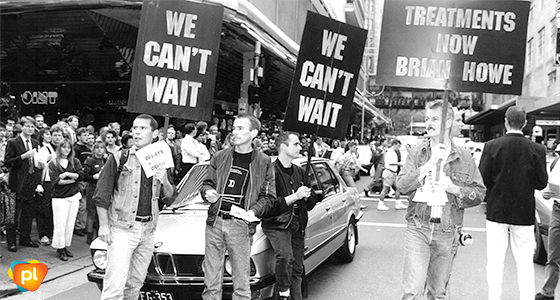
Since the beginning of the HIV epidemic, from the early-80s to the present day, gay men living with HIV have been at the forefront of embracing the latest changes to HIV health in the ‘fight for our lives’ to empower ourselves, support and educate each other to take control of HIV. Several crucial shifts in the HIV landscape have been readily embraced by all people living with HIV in advancing that agenda.
Like our peers who found hope and life in anti-retroviral therapies and championed public access to the medications in the late 80s, we adopted the new combination antiretroviral treatment (cART) in the mid to late 90s rapidly, which improved our life expectancy from months to decades. In 2011, the evidence which proved the protective effect of early treatment against HIV for negative partners in the case of serodiscordant couples (where one partner is HIV positive and the other HIV negative), saw those of us living with HIV support the health and safety of our loved ones by embracing this early game change.
On World AIDS Day 2013, the NSW Health Minister Jillian Skinner MP made an appeal to people living with HIV about our choice to take control of HIV when starting treatment. Two short years later with the release of the START study findings and the benefits to the individual and their community around starting treatment earlier than ever, we threw our support behind this latest game changer. Around the same time when improved access to HIV medication in local community pharmacies commenced in NSW, more people living with HIV exercised their choice to pick up their HIV medication at a time and place convenient, at no cost.
In late 2016, Positive Life took the position that 100% of people diagnosed with HIV be offered treatment immediately. By adopting an immediate treatment commencement position, which halts disease progression and the onward transmission of, people living with HIV stepped into the driver’s seat of our health straight away. With immediate treatment after our HIV diagnosis, we have better long term health outcomes, lower risk of illness and death and contribute to reducing HIV transmission in the broader community. While we talk about ‘game-changers’ in terms of bio-medical or pharmaceutical solutions, the real game changer is the positive person.
Throughout the whole time of the HIV epidemic gay men living with HIV, remained sexually active using and inventing a range of responses to sex and HIV, as we educated our peers to protect the health of our partners. Gay men are the bower-birds of risk reduction strategies when it comes to having sex. We have always been an integral player in negotiated sex conversations concerning HIV prevention.
Many of us use serosorting or only have unprotected sex with others living with HIV to remove the risk of passing on HIV, while others use strategic positioning between partners of mixed sero-status. Many regular or committed partners use disclosure and negotiated safety in relationships. And there’s always the mainstay of condoms. Now with PrEP joining PEP in the prevention arsenal, we have a range of HIV prevention strategies to use depending on the circumstance and situation.
The rise of one of our latest and strongest tools to prevent the transmission of the virus and offer protection to those we love and the broader community is Treatment as Prevention, or TasP (also called U=U). This strategy is used when we take our HIV treatments as prescribed to prevent passing on HIV. When we use TasP to maintain an undetectable viral load (UVL) for at least six months, we’re no longer able to transmit HIV.
While not all of us can achieve or maintain an UVL, for those of us who can, it is recognised as a key sexual health strategy by many health promotion NGOs including World Health Organisation and UNAIDS. Perhaps the strongest evidence of TasP has come out of the global 2016 Partners Study. After 58,000 occasions of ‘bareback’ or condomless sex between 848 sero-discordant couples, there were zero instances of HIV transmission. ZERO! Not one negative partner contracted HIV from their HIV positive partner. As community awareness and understanding about TasP grows, the realisation that TasP works not only for people living with HIV but tells HIV negative people know that those of us living with HIV who have a UVL are sexually safe.
The safer sex landscape has definitely changed. We’ve seen a succession of major HIV game-changes throughout the epidemic. These have been both in the pharmaceutical area as well as in our social interactions as we navigate our way through sex, pleasure and care to manage our health thoughtfully and responsibly. Today with a range of HIV prevention strategies, the sero-divide in the community is changed. HIV positive or negative, there are new ways for all members of our community to care for each other and share responsibility for informed sexual health choices.
Positive or negative, we can all celebrate our sexual pleasures, freedoms and choices in the light of TasP, serosorting, strategic positioning, negotiated safety, PEP and PrEP. Let’s continue to encourage and support each other to take control of our sexual health and talk confidently and openly with each other about our sex and pleasure options and choices.






